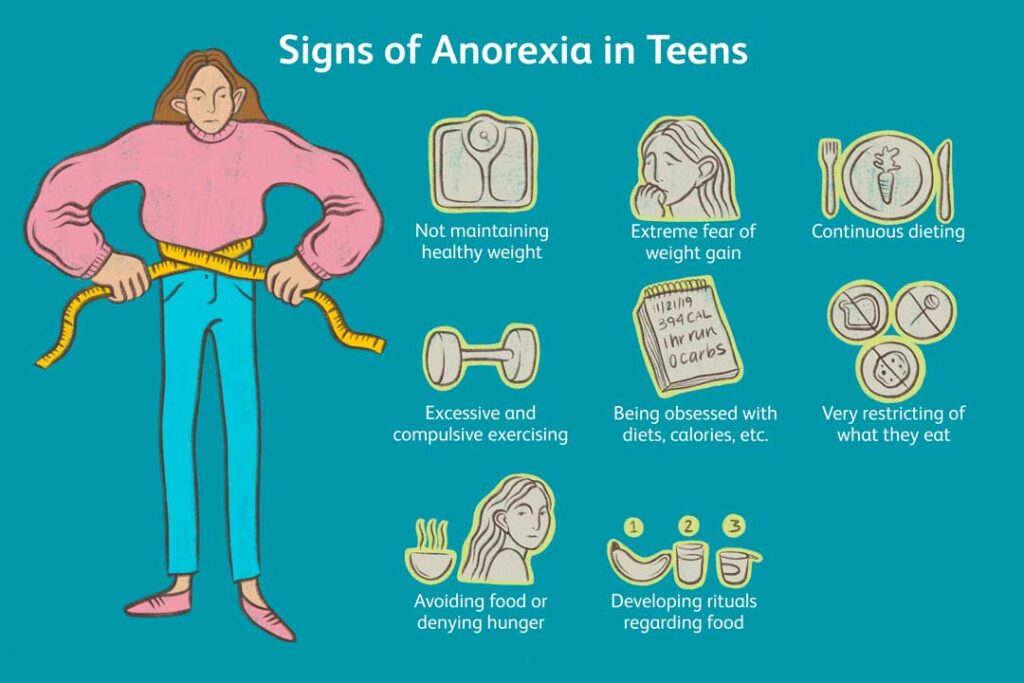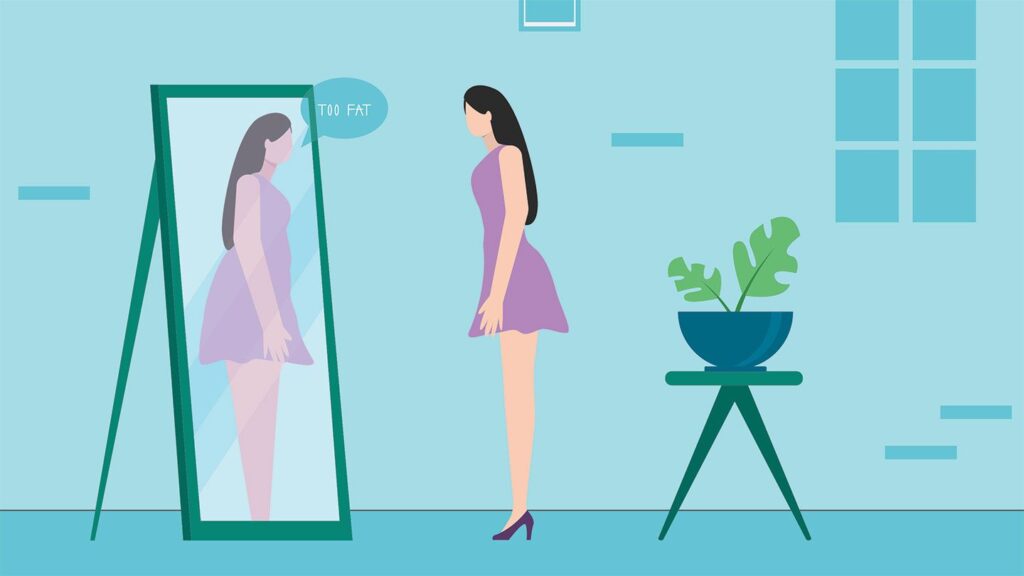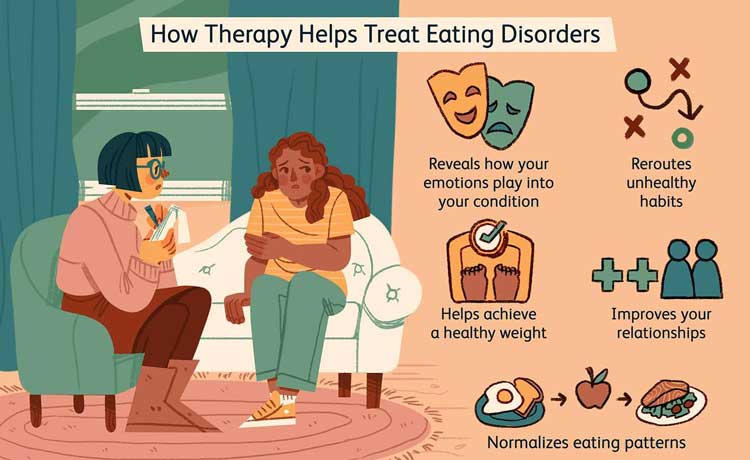OBSESSION ABOUT NOT GAINING WEIGHT – ANOREXIA NERVOSA
Gaining weight is a nightmare for many people. Many people secretly dream of eating anything without gaining weight. But, the thought of not gaining too much weight becomes an obsession that leads to Anorexia Nervosa or anorexia.

Anorexia Nervosa is an eating disorder that results in severe weight loss and is categorized as a psychiatric condition. People suffering from anorexia try hard on controlling their weight and shape, using extreme efforts. This usually tends to significantly interfere with their lives. Many factors like self-esteem and body-image issues, societal pressures, and genetic factors trigger the mental condition especially in females (more in the adolescence age). Men also are sometimes affected by it but the percentage is relatively low.
Anorexia often leads to other problems like slowing in growth & development, decreased bone density, anemia, hormonal imbalances, digestive disorders, malnourishment, and irregularity in heart rhythm. People with anorexia keep a close watch on their calories as well as check weight regularly. They sometimes also use laxatives or diuretics to get rid of as many calories as they can.
WHAT FACTORS CAUSE ANOREXIA NERVOSA?
There is no particular cause of anorexia nervosa. This is a combination of biological, psychological, and environmental factors.
Biological: It is believed genes play a role in anorexia. There are genetic changes that make some people at a higher risk of developing anorexia. People with anorexia may have a genetic tendency toward perfectionism, sensitivity, and perseverance.
Psychological: Often people with anorexia may have obsessive-compulsive personality traits that force them to stick to strict diets and forgo food despite being hungry. They tend to have an extreme drive for perfectionism that forces them to think they’re never thin enough. This causes high levels of anxiety and engage in restrictive eating to reduce it.
Environmental: The effect of modern culture emphasizes being slim. Beauty and worth are often equated with being thin. Peer pressure fuels up the desire to be thin, particularly among young girls.

Anorexia Nervosa can lead to various health problems such as:
- Anemia
- Heart problems, such as mitral valve prolapse, abnormal heart rhythms, or heart failure
- Bone loss (osteoporosis), increasing the risk of fractures
- Loss of muscle
- In females, the absence of a period
- In males, decreased testosterone
- Gastrointestinal problems, such as constipation, bloating, or nausea
- Electrolyte abnormalities, such as low blood potassium, sodium, and chloride
- Kidney problems
- Depression, anxiety, and other mood disorders
- Personality disorders
- Obsessive-compulsive disorders
- Alcohol and substance misuse
- Self-injury, suicidal thoughts, or suicide attempts
WHAT HELPS IDENTIFYING ANOREXIA NERVOSA?
Anorexia Nervosa is a psychological condition that is triggered due to biological, environmental as well as sociological factors. Some physical symptoms observed are:
- Severe loss of muscle mass
- Listlessness, fatigue, or exhaustion
- Low blood pressure
- Lightheadedness or dizziness
- Low body temperature causing cold hands and feet or hypothermia
- Bloated or upset stomach
- Dry skin
- Swollen hands and feet
- loss
- Loss of menstruation or less frequent periods
- Infertility
- Insomnia
- Loss of bone density, increasing the risk of fractures
- Brittle nails
- Constipation
- Irregular or abnormal heart rhythms
- Lanugo, which is fine downy hair on the body
- Increased facial hair
- Bad breath and tooth decay
The obsession with cutting down the calorie intake to avoid gaining weight impacts the nutritional intake in people. Mineral as well as vitamin deficiencies are common and also lead to many diseases which can be life-threatening. Healthcare professionals look for certain traits like restricting food intake, fear of gaining weight, or problems with body image among people.

Along with physical symptoms, there are various psychological symptoms, such as:
- Limiting the overall food intake or the range of foods.
- Showing excessive concern with weight, body size, dieting, calories, and food.
- Exercising for long hours.
- Taking laxatives, or inducing vomiting.
- Assessing their body weight and size frequently.
- Talking about being “fat” or having overweight.
- Denying feeling hungry or avoiding mealtimes.
- Developing food rituals.
- Cooking for others without eating.
- Withdrawing from social interaction.
- Showing signs of depression.

HOW DOES CHIROPRACTOR HELP IN TREATING ANOREXIA NERVOSA?
Chiropractic care is a recognized form of treatment that provides substantial results for those affected by anorexia nervosa.
Visiting one of our Zenith centers allows you to receive adjustments and personal lifestyle advice that focuses on:
- Balancing all the hormone levels.
- Increasing and improving immunity performance.
- Reducing allergies.
- Developing gastrointestinal complications.
- Reversing personal depression.
- Eliminating all dangers of suicidal tendencies.
Experts at Zenith provide nutritional guidance along with chiropractic care to help cope up with anorexia nervosa. Including, zinc, vitamin B12, vitamin D, vitamin E etc. that may show benefits. It is important to treat the psychological condition through psychotherapy as well as family therapy so that the patient may be aware of the body needs. Treatment advised by the doctors includes medication to treat the symptoms as well as nutritional counseling to improve health of the patient.
Patients usually feel it is difficult to break the resistance for constant calorie watch which makes the treatment to be long term and the condition may relapse in case of stress. Cognitive-behavioral therapy helps people to change their negative and unhealthy thoughts as well as cope up with strong emotions to build self-esteem.
Anorexia may worsen if not treated at the right time. It is important to be healthy from within and mentally. It is important to be happy with ourselves and not be under social pressure. Some tips that help people to recover are by being respectful rather than judgmental. Sticking to the therapy as well as following the dietician will help to be healthy both mentally and physically.
Various strategies include:
- Cognitive-behavioral therapy (CBT) – This can help the person with anorexia nervosa find new ways of thinking, behaving, and managing stress.
- Family and individual counseling, as and when required.
- Nutritional therapy, which provides information on how to use food to build and maintain health.
- Medication to treat depression and anxiety.
- Supplements to resolve nutritional deficiencies.

OUTLOOK
Anorexia nervosa is an eating disorder that may cause serious mental health conditions. This leads to restricting food intake leading to severe nutritional deficiencies. The side effects of anorexia nervosa can be life-threatening. This can be reduced with counseling, medication, and treatment for underlying mental health issues that can help people with this condition.
People Also Read:
Obesity – Causes, Symptoms and Treatment
Get Healthy Eating Tips
If you or anyone you know is trying for weight loss, our expert providers at Zenith Injury Relief & Wellness Clinic will take care of your health and help you recover.
Call us on 972-210-0033 to book an appointment with our specialists, and begin living your life pain-free.
